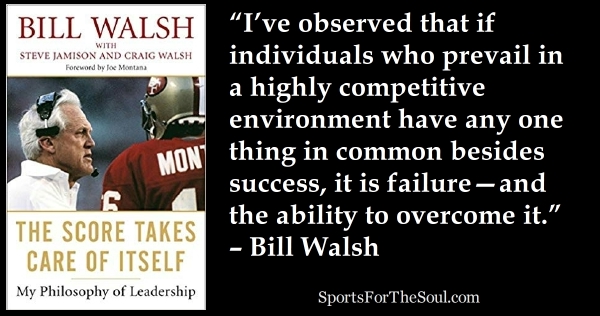 Bill Walsh was a football genius. He changed the game of pro football with his innovative, pass-heavy West Coast Offense while winning three Super Bowls with the San Francisco 49ers in the 1980s.
Bill Walsh was a football genius. He changed the game of pro football with his innovative, pass-heavy West Coast Offense while winning three Super Bowls with the San Francisco 49ers in the 1980s.
Walsh was also an avid student of the game of life. He was driven to find out what separated the most successful people from everyone else. In sports, in business, and in life, Walsh found a unique element shared by every great success story…
One of the profound lessons I have learned during my career (is that) even when you have an organization brimming with talent, victory is not always under your control. Rather, it’s like quicksilver—fleeting and elusive, not something you can summon at will even under the best circumstances.
Almost always, your road to victory goes through a place called “failure.”
That reality was present throughout my career. There is no guarantee, no ultimate formula for success.
However, a resolute and resourceful leader understands that there are a multitude of means to increase the probability of success. And that’s what it all comes down to, namely, intelligently and relentlessly seeking solutions that will increase your chance of prevailing in a competitive environment.
When you do that, the score will take care of itself.
Pursuing your ambitions, especially those of any magnitude, can be grueling and hazardous, and produce agonizing failure along the way, but achieving those goals is among life’s most gratifying and thrilling experiences. The ability to survive and overcome the former to attain the latter is a fundamental difference between winners and losers.
I’ve observed that if individuals who prevail in a highly competitive environment have any one thing in common besides success, it is failure—and the ability to overcome it.
“Crash and burn” is part of it; so are recovery and reward.
— Bill Walsh, from his book The Score Takes Care of Itself
Too often, people assume that those who succeed at a high level have figured out some secret formula for success.
Bill Walsh is a perfect example of this misconception. It’s easy to look back on his Hall-of-Fame coaching career and assume his success was due to his groundbreaking offense and his roster of talent. And yes, certainly those things played a role in Walsh’s success as a coach.
However, Walsh had no “secret formula” for success. He had no special advantage over other coaches who presided over successful NFL teams during the same era—Bill Parcells, Joe Gibbs, Don Shula, or Mike Ditka.
What each of these legendary coaches did have in common was their ability to withstand failure and keep moving forward.
They didn’t get so discouraged by bad breaks and setbacks that they ended up quitting.
They recognized that while they couldn’t control everything, by focusing on the things they could control, the score would eventually take care of itself.
They responded to every setback with a problem-solver’s approach. They were convinced that there was a solution to every problem—they simply had to find it.
In short, they refused to give up.
Those who keep pushing forward and refusing to give up become champions. They don’t win every time, of course, but they win enough times to separate themselves from the rest of the pack.
It’s the approach to failure that makes the difference.
Those who rise to the top are those who get motivated to work harder, learn more, and try new approaches after a defeat. Those who never reach their goals are those who get so discouraged or embarrassed by defeat that they end up quitting.
You can’t be afraid of—or embarrassed by—failure if you expect to achieve your biggest goals.
As Bill Walsh explains, you must be willing to fail if you want to ultimately succeed.
Failure and setbacks should motivate you to try harder, not discourage you into giving up.







